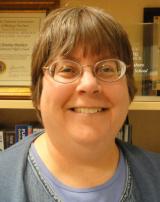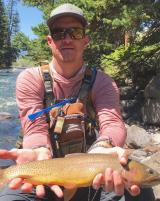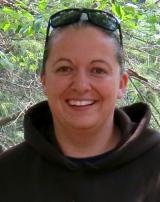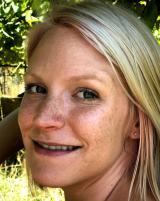Presidential Innovation Award for Environmental Educators (PIAEE) 2018 Winners
EPA Region 1
Christine Brothers, Falmouth High School
Falmouth, Massachusetts
After working at three different nature centers as a naturalist and educator for 10 years, Christine Brothers became a science teacher at Falmouth High School, where she has taught various science classes since 1995. Four years ago, she developed a new Advanced Placement Environmental Science (APES) course at the school, for which she conducted research, prepared curricula, and obtained $10,000 in grant funding to purchase lab equipment and teaching supplies to support experiential learning.
Leveraging experience gained during a trip to Brazil as part of a Research Experience for Teachers grant funded by the National Science Foundation, Christine developed a “Carbon Cycle and Climate Change” project at Falmouth High School that she uses as part of her APES curriculum. The project replicates research techniques she learned in Brazil. Students conduct field work in the forest behind the school to measure tree circumference and height, identify species, take tree core samples and weather measurements, use various hand-held instruments, and collect soil samples for later analysis in the lab.
Her students also participate in a Watershed Assessment field trip that traces the course of a river from its origin to the ocean. Students take water samples and later conduct lab tests to calculate a water quality index. During the field trip, students interact with scientists and environmental professionals who demonstrate how to conduct environmental research and serve as career role models. Students participate in another field trip to tour the town water treatment and wastewater treatment plants, where they learn about water resources, energy, and pollution. The field trip also includes a tour of the Southeastern Massachusetts Resource Recovery Facility trash burning power plant, where students learn about solid waste issues, energy generation, and air pollution emissions.
Christine also advises the Falmouth High School Ecology Club, which extends her environmental education work beyond the classroom. The club’s members engage in service activities and promote environmental conservation in the community. Each year, the club chooses a cause, such as arctic wildlife, rainforests, coral reefs, or endangered primates, and then holds fundraisers throughout the year to support the cause. Each spring for Earth Day, club members visit one of the local elementary schools to present the cause to 3rd grade students, using presentations, displays, and activities or games. Continually searching for ways to creatively engage her classes, Christine hopes to inspire her students to pursue a career in environmental science or environmental education.
EPA Region 2
No 2018 winners.
EPA Region 3
No 2018 winners.
EPA Region 4
Timothy Chase, Bluffton High School
Bluffton, South Carolina
As a science teacher at Bluffton High School, Timothy Chase actively seeks opportunities to take his students outside and create outdoor classrooms to enhance their learning. When he started at Bluffton in 2012, he began working on an outdoor classroom known as the SOIL Project (Sustainable Outdoor Inquiry Learning), a sustainable, organic demonstration food garden that composts cafeteria waste, harvests rainwater, and uses raised beds made from reclaimed shipping pallets.
- allow students to explore environmental issues outside whenever possible,
- empower students to explore solutions to environmental issues in their own community, and
- inspire them to engage in community service related to those issues.
Recognizing that he is often not the subject matter expert on every environmental topic, Timothy often brings in local experts to meet with students, such as having a refuge manager and aquatic biologist from the Savannah National Wildlife Refuge help his Advanced Placement Environmental Science Students perform a fish survey and population study at the school retention pond.
Timothy also extends his environmental ethic and influence on the rest of the student body by sponsoring an environmental club at the school. In the past, the club has built rain barrels, raised beds for the organic vegetable garden, and a compost center that produces fertilizer for the gardens. The environmental club also organizes community service days with other student groups to participate in environmental projects. He actively reaches out to colleagues at his school to expand the environmental education and literacy curriculum beyond the science classroom, including working with ESOL (English for Speakers of Other Languages) teachers to develop meaningful project-based learning modules with an integrated environmental education theme.
Timothy also leads workshops and professional development sessions to inform other teachers about environmental education strategies and initiatives, and has taught or organized sessions at the Beaufort County School District Summer Institute for several years.
EPA Region 5
Anna Dutke, Jeffers Pond Elementary
Prior Lake, Minnesota
During the 2014-2015 school year, Anna Dutke developed a nature-based preschool option and piloted it for the Circle of Friends Preschool. The pilot was designed to align the preschool with the Prior Lake-Savage Area School district-wide E-STEM initiative (Environmental Education, Science, Technology, Engineering and Math).
E-STEM is an instructional approach that emphasizes inquiry-based and real-world problem-solving by integrating hands-on science, technology, engineering, and mathematical practices with projects and field experiences related to the environment. At the start of the 2015-2016 school year, Anna’s nature-based preschool classroom relocated to Jeffers Pond Elementary, creating new opportunities to bring preschool students together with kindergarten through 5th grade students.
A “buddy class” partnership was formed with the 5th grade, and the preschool and 5th grade students met weekly to engage in activities and lessons that integrate environmental education along with the preschool and 5th grade curriculum and learning standards. In 2017, the students presented a research project about squirrel enrichment (protecting and preserving squirrel habits) at the University of Minnesota’s Ecology Fair, which was notable because the preschool students were the youngest participants in the fair’s history.
In 2015-2016, Anna formed a Family Nature Club with her colleagues that provides free, monthly gatherings for families at one of the school district’s outdoor learning centers, where family members conduct activities that foster and support exploration and nature play.
Anna also co-leads her school’s Junior Naturalist Program that is geared toward 3rd grade through 5th grade students who want to be leaders in environmental education. At the beginning of the school year, students in the program select a focus area (such as waste reduction, schoolyard habitats, or energy conservation), identify challenges or aspects of the focus area in which they may need additional education, and plan and implement activities at the school to address the focus area.
Anna’s students are developing a strong foundation and excitement for learning, increasing their understanding of the impact they have on nature, and developing a sense of responsibility and stewardship. Anna’s efforts have inspired kindergarten teachers across the district to incorporate more nature-based learning into their curricula.
EPA Region 6
No 2018 winners.
EPA Region 7
Morgan Skaith, Carden Park Elementary School
St. Joseph, Missouri
Using a project-based learning approach to prepare lessons, Morgan Skaith provides opportunities for her 3rd grade students to learn about the environment in a unique, fun, and authentic way. Morgan’s students are participating in the redesign of the local Riverfront Park in St. Joseph, Missouri, which is undergoing a revitalization effort. Students met with the City Planner and the Historic Preservation Planner to learn about city planning, development, and zoning, and have met with a landscape architect to discuss the design process. Students are learning about enhancements that could benefit the park, such as adding a historic monument, promoting natural features that support the local ecosystem, and building a play area and a pedestrian path.
Students have taken ownership of specific projects associated with the park’s redesign and have been given the opportunity to pursue interests they discover while supporting those projects. For example, students have learned more about butterflies and their habitats based on the concept and design of a butterfly garden.
Carden Park Elementary School is a Title 1 school with a high population of underprivileged students living in poverty. Through Morgan’s lessons, students are taking ownership of their learning abilities and feel empowered to solve real-world problems involving the environment, especially in their own community. By challenging students with responsibilities, she is also instilling pride and confidence. Morgan is a leader in the St. Joseph School District, piloting Next Generation Science Standards (NGSS) resources and assisting in writing the school district’s science curriculum. She capitalizes on the skills and strengths of her colleagues to integrate environmental education into multiple classrooms and subject areas (such as reading, writing, and math), which helps students learn about the environment in a real-world context. Because Morgan provides a positive and inspirational classroom setting, her students are engaged with their community and committed to its improvement.
EPA Region 8
No 2018 winners.
EPA Region 9
No 2018 winners.
EPA Region 10
No 2018 winners.
2018 PIAEE Honorable Mentions:
Edmund Smith, Two Rivers Magnet Middle School
Andover, Connecticut
Through his “Exploratory Science” course at Two Rivers Magnet Middle School, Edmund Smith brings many experiential, project-based, and authentic learning opportunities to a diverse population of students to teach them about the uniqueness and diversity of the environment. With 25 years of teaching experience, his curriculum is designed to be fluid, dynamic, and responsive to current environmental issues. Edmund actively connects with local organizations to identify opportunities to introduce his students to real-world experiences and engage them in service learning. His students participate in water quality studies with local scientists from the U.S. Geologic Survey, visit and tour the local wastewater plant to learn about water treatment models, and work with the Great River Park administration to build and maintain beaver-prevention cages to prevent erosion.
In 2016, Edmund collaborated with the University of Connecticut, the Connecticut Museum of Natural History, and the Connecticut National Geographic Society to run a BioBlitz at his school, during which they set the world record for most species identified (2,765) in a 24-hour period. Edmund also organizes and collaborates on numerous other extracurricular activities, including the Middle School Envirothon/Junior Envirothon, biodiversity summer camps, and the National Science Bowl. He has received the Connecticut Outdoor Environmental Educators Association’s “Teacher of the Year” award and received recognitions from the American Groundwater Trust and the Connecticut Department of Energy and Environmental Protection. Dozens of his former middle school students have gone on to pursue higher-level environmental coursework in both high school and college, and several have pursued environmental careers.
Rosalina Alvarado, Bernardino Cordero Bernard Vocational High School
Ponce, Puerto Rico
As a science teacher with more than 28 years of experience, Rosalina Alvarado teaches Puerto Rican students from low-income and disadvantaged communities about environmental problems and social responsibility. During the 2015-2016 academic year, Rosalina developed the problem-based learning method known as P.A.N.A.S. (acronym for “environmental project of our friends of the superior”) to foster environmental innovation and achievement. At the beginning of the 2017-2018 academic year, Puerto Rico faced an immense challenge as Category 4 Hurricane Maria struck the island, devastating infrastructure and terrestrial and aquatic ecosystems. Rosalina’s project “P.A.N.A.S: Heroes in time of crisis” encouraged students to assume a leadership role in responding to the ensuing humanitarian and environmental crisis. Rosalina focused on continued education and resiliency by adapting to teaching classes and presenting lessons without electricity.
Her project required students to take a leadership role and conduct research on situations impacting the community. Students were trained using the STREAM (Science, Technologic, Research, Engineering, Arts, Mathematics) strategy, which is a problem-based learning method that helps students build their own knowledge and demonstrate skills to find solutions to real-world problems in the community. Students interacted with health professionals, parents, and community members to positively channel concerns and expedite the healing process. In 2017, project P.A.N.A.S. was awarded an EPA Environmental Champion Award, and Rosalina received Special Congressional Recognition from the U.S. House of the Representatives for outstanding and invaluable service to the Puerto Rican community.
Lynn Hughes, High Bridge Elementary School
High Bridge, New Jersey
With more than 46 years of teaching experience, Lynn Hughes seeks opportunities to make learning about the environment fun and exciting for her students by incorporating real-world environmental issues and hands-on, inquiry-based learning into her curriculum. She formed High Bridge Elementary School’s environmental club 37 years ago, which offers a combination of education on current environmental topics, hands-on activities, and guest speakers. In 1999, Lynn received a Hunterdon County Education Foundation grant to create a nature trail and outdoor classroom on elementary school property, which contains informative signs that describe the diversity of native flora and fauna. She also prepared a tree identification guide and sample lesson plans that can be used by teachers in all subject areas in the outdoor classroom, and she helped start a vegetable garden at the school that is maintained by all students.
Lynn has ongoing partnerships with and invites speakers from the National Wildlife Federation, Hunterdon County Park System, and Raritan Headwaters Organization to present environmental topics to students. Her students also participate in community-based projects, such as Raritan Headwaters watershed monitoring, Raritan River cleanup day, and Earth Day events. In 2015, Lynn received the Environmental Education Champion recognition award from Hunterdon County for her commitment to promoting environmental awareness among the schools’ students, staff, and parents and encouraging them to become environmentally responsible citizens.
Sarah Garrett, Jackson Middle School
Champlin, Minnesota
As a teacher at Jackson Middle School with more than 14 years of experience, Sarah Garrett uses a hands-on approach in the classroom with a focus on citizen science and experiential education concepts to make learning about the environment fun and relevant. Her students write investigable questions while learning about the importance of pollinators and birds in the local ecosystem, as well as the water cycle and water quality issues. Her classes participate in several field trips each year, including visiting the Cedar Creek Ecosystem Science Reserve to learn about the ecosystem’s history and biodiversity and to practice their tree identification skills. Other valuable experiential learning opportunities include touring the Minneapolis Drinking Water Treatment plant and the Elk River Wastewater Treatment plant to study the urban water cycle.
At the end of the school year, students in her class select an organism of their choice and return to Cedar Creek to study it in collaboration with graduate students from the University of Minnesota - Twin Cities. They prepare questions, collect and analyze data, and present their findings to their classmates in an authentic science-roundtable experience. Sarah also helps influence her school’s environmental culture by promoting conservation concepts during special events on Earth Day and Arbor Day, raising money for environmentally friendly charities, and sponsoring a “Black Out Week” during which her classes promote energy-saving strategies and concepts.
Melanie Falcon, Smoky Valley Middle School
Lindsborg, Kansas
Over the last 11 years as a middle and high school science teacher, Melanie Falcon has helped students achieve success at both the regional and state levels of the Kansas ECO-Meet competition, and thereby win thousands of dollars in scholarships. The Kansas ECO-Meet is an academic extracurricular activity that inspires kids in 8th grade all the way through 12th grade to learn about the flora and fauna in the state of Kansas. Each fall, almost 25 percent of the students voluntarily sign up for the science club led by Melanie for the chance to participate in the meet and qualify for the regional and state levels. Through her classes and the science club, Melanie provides opportunities for students to gain outdoors, hands-on experience in the field, where they are exposed to different plant species and learn to work together and enhance their critical problem-solving and delegation skills.
Melanie’s environmental program also consists of conducting community service projects, offering summer science camps led by the science club for elementary school students, and guiding elementary school field trips in conjunction with the science class to study conservation and management practices. Melanie started a school STEM club to teach the principles of science, technology, engineering, and mathematics while promoting engaging hands-on activities. In the spring of 2018, she was awarded the 2018 Kansas Association for Conservation and Environmental Education (KACEE) Award for her work supporting environmental education.
Sergio de Alba, R.M. Miano Elementary School
Los Banos, California
As the son of a farm worker, Sergio de Alba has a special connection with his students, more than 80 percent of whom are from low-income communities and have family members that work in the fields surrounding their small rural town. Students at R.M. Miano Elementary School have a limited knowledge about how the world is interconnected, which prompted Sergio to create the “Chocolate Unit.” The unit was designed to help his students learn about the global impact of agriculture, nutrition, and the connection humans have with the environment by focusing on the region in which cocoa is grown and using hands-on lessons that provide an avenue for discussion and research. Students analyze data and research topics such as health benefits, fair trade concerns, and climate issues, and they work on a variety of math, science, and persuasive writing problems.
Sergio has also led the development of 20 gardens at the school, providing the entire campus of almost 1,000 students with an avenue to learn the required curriculum in a more engaging way -- the entire school property has become a classroom. He also formed an Agriculture Club and started the school’s We Recycle Program. Sergio’s lessons create a lasting impression on students’ lives and in their perception of the world as they learn that their actions have an impact, not only on the town in which they live, but the world in general.




